UC Berkeley Press Release
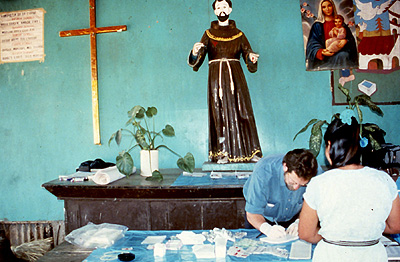 |
Eric Stover, director of the UC Berkeley Human Rights Center (second from right), takes a blood sample from a relative of a missing child in a village in central Salvador. (Robert Kirschner photo) |
DNA database offers Salvadoran war orphans key to stolen past
BERKELEY – A DNA database developed by the state Department of Justice and the University of California, Berkeley's Human Rights Center holds the key to the past for hundreds of children kidnapped by soldiers or otherwise separated from their families during El Salvador's 1980-1992 civil war.
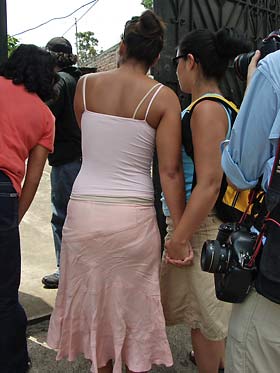 Sisters Imelda and Heidi Marroquin of Boston prepare to meet their biological family in El Salvador. (Photo by Liz Barnert) |
Untold numbers of babies and youngsters were snatched by soldiers from their families - in some cases as war trophies - during military sweeps to wipe out leftist guerilla sympathizers during the armed conflict. Some were raised on military bases. Others were placed in orphanages or foster homes. Many of the younger ones were adopted by families in the United States and Europe who were led to believe the children had been orphaned by the war or abandoned by their parents.
"Decades later, the families of these abducted children are still searching for their children," said Eric Stover, director of the UC Berkeley Human Rights Center, which does research on war crimes, among other abuses. "DNA analysis offers the best hope of positively identifying these children - many of whom are now young adults - and reuniting them with their relatives."
Among those searching for clues to the past is Angela Fillingim, a UC Davis sociology student adopted by a Berkeley couple from El Salvador in 1985 when she was six months old. This past January, she learned the identity of her biological mother and plans to visit El Salvador next year to meet her and other blood relatives. But Fillingim, 21, is timid about pressing them for too many details.
"I've been afraid to ask because I know it's very painful," she said.
Leading the charge to reunite these children with their Salvadoran relatives is Asociación Pro-Búsqueda de Niñas y Niños Desaparecidos (Search for the Missing Children), whose cofounder, the late Father Jon Cortina, asked Stover for help in 1994 when Stover was executive director of the Boston-based Physicians for Human Rights.
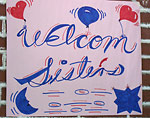 The Marroquin sisters' Salvadoran relatives posted this sign at the reunion. (Photo by Lucio Carrillo/Asociación Pro Búsqueda de Niñas y Niños Desaparecidos) |
Stover, an authority on forensic science and human rights, traveled to Pro-Busqueda's headquarters in San Salvador and launched the "DNA Reunification Project." In 1996, he brought the project with him to UC Berkeley when he became director of the Human Rights Center. Later, he asked the state's Jan Bashinski DNA lab in Richmond, Calif., to contribute to the search. The partnership has expedited the completion of the database, which is set to be turned over to Pro-Búsqueda in July.
In the last decade, Pro-Búsqueda has located at least 300 of the more than 700 children reported missing. With revelations about the military abductions emerging in newspapers and on Web sites, Salvadorans who were adopted internationally have contacted Pro-Búsqueda, DNA matches have been made and reunions arranged.
"Pro-Búsqueda is not trying to undo adoptions, but really is trying to give young people an opportunity to know their biological background and their families, and work out a relationship with them," said Rachel Shigekane, senior program officer at the Human Rights Center, which is part of UC Berkeley's International and Area Studies.
Evenings and weekends, volunteer forensic scientists add profiles to the genetic family database at the Jan Bashinski lab so that when a missing child is located, his or her DNA can be run through the database. When a child is located, emotions range from feelings of abandonment to fulfillment, said Liz Barnert, a medical and public health student at UC Berkeley and UCSF who has witnessed reunions, or reencuentros, between missing children and their Salvadoran relatives.
The armed conflict between El Salvador's government and the insurgent Farabundo Marti National Liberation Front (FLMN) claimed more than 75,000 lives. A peace accord signed in 1992 led a United Nations Truth Commission to investigate human rights abuses carried out by the military. But though the commission found numerous violations, a 1993 amnesty law barred prosecution for any war crimes.
To date, there have been no Salvadoran governmental investigations into the missing children. Pro-Búsqueda receives no support from the Salvadoran government, and relies largely on volunteers, according to the Human Rights Center.
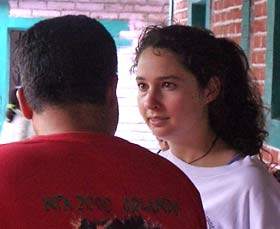 UC Berkeley public health student Liz Barnert (right) interprets for family members at the reunion in El Salvador. (Photo by Lucio Carrillo/Asociación Pro Búsqueda de Niñas y Niños Desaparecidos) |
As a Pro-Búsqueda volunteer and fellow with the Human Rights Center last summer, Barnert assisted in the collection of DNA samples from all over El Salvador. An excursion would typically entail a three-hour drive, one hour of it on a bumpy road, and a trek through one or more cornfields.
While some Salvadorans were eager to cooperate with her, grateful for help in finding their missing relatives, others were reluctant and even suspicious of Barnert's motives. For example, Barnert recalled one gentleman farmer who rode in on his horse to a DNA collection gathering, and aggressively fired questions at her. Barnert explained what she was doing, and offered him the only free chair on the patio. "'No, you sit down. You need to work,'" he said.
As a result of that collection effort, the database is close to complete. Now, Shigekane said, efforts must turn to tracking down and collecting the DNA of children who were adopted internationally. That requires outreach, research and more money - money the Human Rights Center doesn't have, she added.
Another obstacle is resistance from adoptive families who are afraid to unlock the door to the past. "The saddest thing is when the child has been located, but there hasn't been a reunion," Barnert said.
Indeed, Marco Perez Navarrete, a psychologist with Pro-Búsqueda who provides counseling for members of these estranged families as they get acquainted, said the reunions are a critical step in the process of integrating various parts of one's identity.
"In this way, the young person and his or her biological family can begin to regain their dignity as human beings," he said.
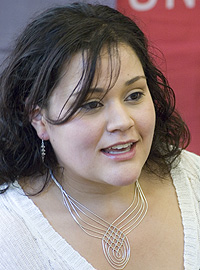 Angela Fillingim was adopted from El Salvador by a Berkeley couple when she was six months old. Her birth mother (below, with her brother) has since been identified. 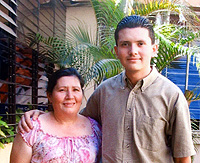 |
Fillingim says she's lucky that her parents, both Caucasian social workers, did not feel threatened by her efforts to learn Spanish and explore her roots. On the contrary, she said, they supported her each step of the way.
Her search intensified during her sophomore year at Berkeley High School when she learned about El Salvador's civil war. Then last summer, she traveled to El Salvador and met with Pro-Búsqueda representatives, as well as with Barnert, to whom she gave a DNA sample. In December, she was contacted by Pro-Búsqueda staff members who had tracked down her mother through paperwork and other investigative methods. DNA confirmation of their relationship is pending.
So far, Fillingim has been able to establish that her mother was from the northeast Chalatenango region, which had been the target of a nine-day counter-insurgency operation in 1982 that left hundreds dead. As yet, she is unclear exactly how she got separated from her family, but her mother has indicated that she put her up for adoption because it was too dangerous to keep her in Chalatenango.
Fillingim is planning a trip to meet her mother and teenage brother for the first time in summer 2007, before she starts graduate school. She's nervous about the reunion, but said she feels secure and grounded enough to face her past.
"It's not like I'm trying to find a family. I have one," Fillingim said. "I'm trying to find myself in relation to my family. I'm taking baby steps.

